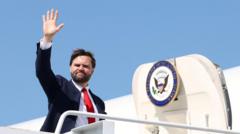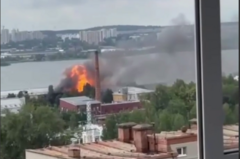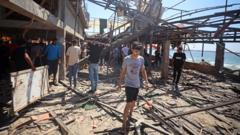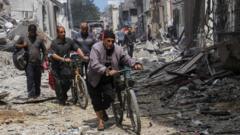In a recent interview, Vice-President JD Vance commented on the prolonged nature of the war in Ukraine, highlighting the importance of diplomatic efforts for resolution. His statements followed a US-Kyiv agreement on mineral resources, as both nations grapple with ongoing violence and the complexities of territorial negotiations.
US Officials Reflect on the Ongoing Conflict in Ukraine

US Officials Reflect on the Ongoing Conflict in Ukraine
Vice-President JD Vance expresses skepticism about a quick resolution to the Ukraine conflict, emphasizing the need for dialogue between Russia and Ukraine.
The war in Ukraine appears far from a swift conclusion, according to US Vice-President JD Vance, who shared his views during an interview with Fox News. “It’s not going to end any time soon,” he asserted, suggesting the pressing question for the US administration is how it can facilitate a compromise between Russia and Ukraine to reach a truce. This ongoing conflict has persisted for over three years, inflicting severe consequences on both nations.
Vance emphasized the fundamental necessity for the two countries to negotiate their own settlement, stating, "it's going to be up to [Russia and Ukraine] to come to an agreement and stop this brutal, brutal conflict." His remarks followed a recent US agreement with Ukraine, allowing for a shared benefit from the latter's rare earth minerals in exchange for increased US support.
Defending former President Donald Trump's strategy regarding the war, Vance acknowledged the valid grievances of Ukrainians but questioned the cost of continued military engagement for minimal territorial gains. Trump has suggested that Ukraine might consider relinquishing Crimea, annexed by Russia in 2014, as a potential avenue for peace. Still, Ukrainian President Volodymyr Zelensky has indicated constitutional barriers that would prevent him from accepting such terms.
In a concurrent interview, US Secretary of State Marco Rubio underscored the urgency for a breakthrough in the conflict, suggesting that the administration must realistically assess the situation as time progresses. Recently, Russian President Vladimir Putin proposed a temporary ceasefire, coinciding with commemorations of World War Two; however, amid ongoing violence, Ukrainian foreign minister Andrii Sybiha called for a 30-day ceasefire, reflecting the desperate need for respite.
Reports from Thursday revealed continued hostilities, including a Russian drone strike on Zaporizhzhia injuring 14 civilians, and accusations from Moscow claiming a Ukrainian drone attack on a market in Russian-controlled territory, which led to casualties among civilians and military personnel. Kyiv refuted claims of targeting non-military sites, asserting its defense efforts focus solely on military assets. Amidst rising tensions and intricate diplomatic challenges, the Ukraine conflict remains unresolved, with leaders on both sides facing critical decisions.





















